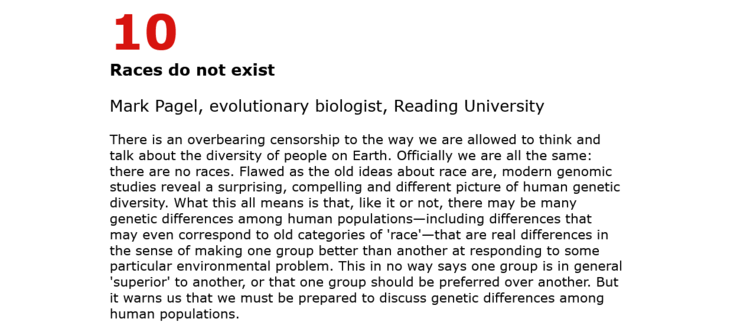


02/14/2008
This is from Edge.org One hundred and sixty-five eminent thinkers, researchers, and communicators, at the annual request of the edge.org website, answered the following question: "What Have You Changed Your Mind About? Why?", and here’s one man’s answer:
Races do not exist
Mark Pagel, evolutionary biologist, Reading University
There is an overbearing censorship to the way we are allowed to think and talk about the diversity of people on Earth. Officially we are all the same: there are no races. Flawed as the old ideas about race are, modern genomic studies reveal a surprising, compelling and different picture of human genetic diversity. What this all means is that, like it or not, there may be many genetic differences among human populations–including differences that may even correspond to old categories of 'race'–that are real differences in the sense of making one group better than another at responding to some particular environmental problem. This in no way says one group is in general ’superior' to another, or that one group should be preferred over another. But it warns us that we must be prepared to discuss genetic differences among human populations.
Via Kathy Shaidle, who headlined it Racial differences are real, says prof who'd better damnwell have tenure. The late Richard Herrnstein suffered for his opinions in spite of tenure. Peter Brimelow wrote:
[O]ne day in the early 1970s found himself hidden under a sink in the University of Iowa faculty lounge ("having a very pleasant chat with a graduate student") while radical demonstrators bayed for his blood. He was eventually rescued by armed guards. This was the flower-child generation’s response to Herrnstein’s September 1971 cover story in Atlantic Magazine discussing intelligence and its social implications. For a year every class he gave at Harvard was disrupted. The Harvard administration waffled.
But they couldn’t fire him.
"But Dick would never have backed off an unpopular idea," says Charles Murray. "He thought that was what tenure was for."
In Herrnstein’s 1994 obit, Charles Murray described a discussion they had before The Bell Curvecame out:
About four years ago, shortly after Dick and I had begun to collaborate on a new book about intelligence and social policy, we were talking over a late-evening Scotch at his home in Belmont, Mass. We had been musing about the warning shots the prospective book had already drawn and the heavy fire that was sure to come. The conversation began to depress me, and I said, "Why the hell are we doing this, anyway?"
Dick recalled the day when, as a young man, he had been awarded tenure. It was his dream fulfilled — a place in the university he so loved, the chance to follow his research wherever it took him, economic security. For Dick, being a tenured professor at Harvard was not just the perfect job, but the perfect way to live his life. It was too good to be true; there had to be a catch. What’s my part of the bargain? he had asked himself. "And I figured it out," he said, looking at me with that benign, gentle half-smile of his. "You have to tell the truth." There was no self-congratulation in his voice, just an answer to my question.